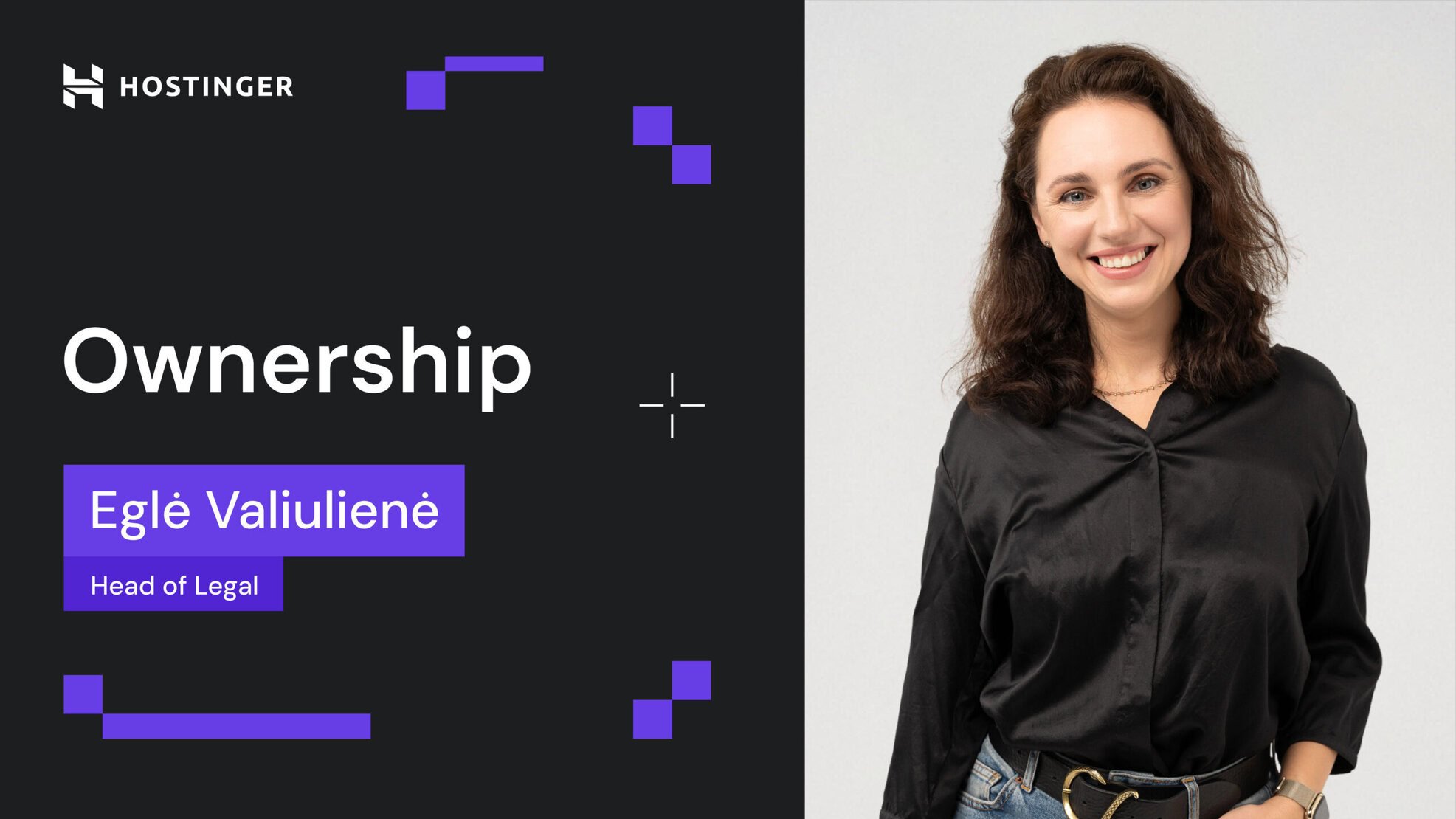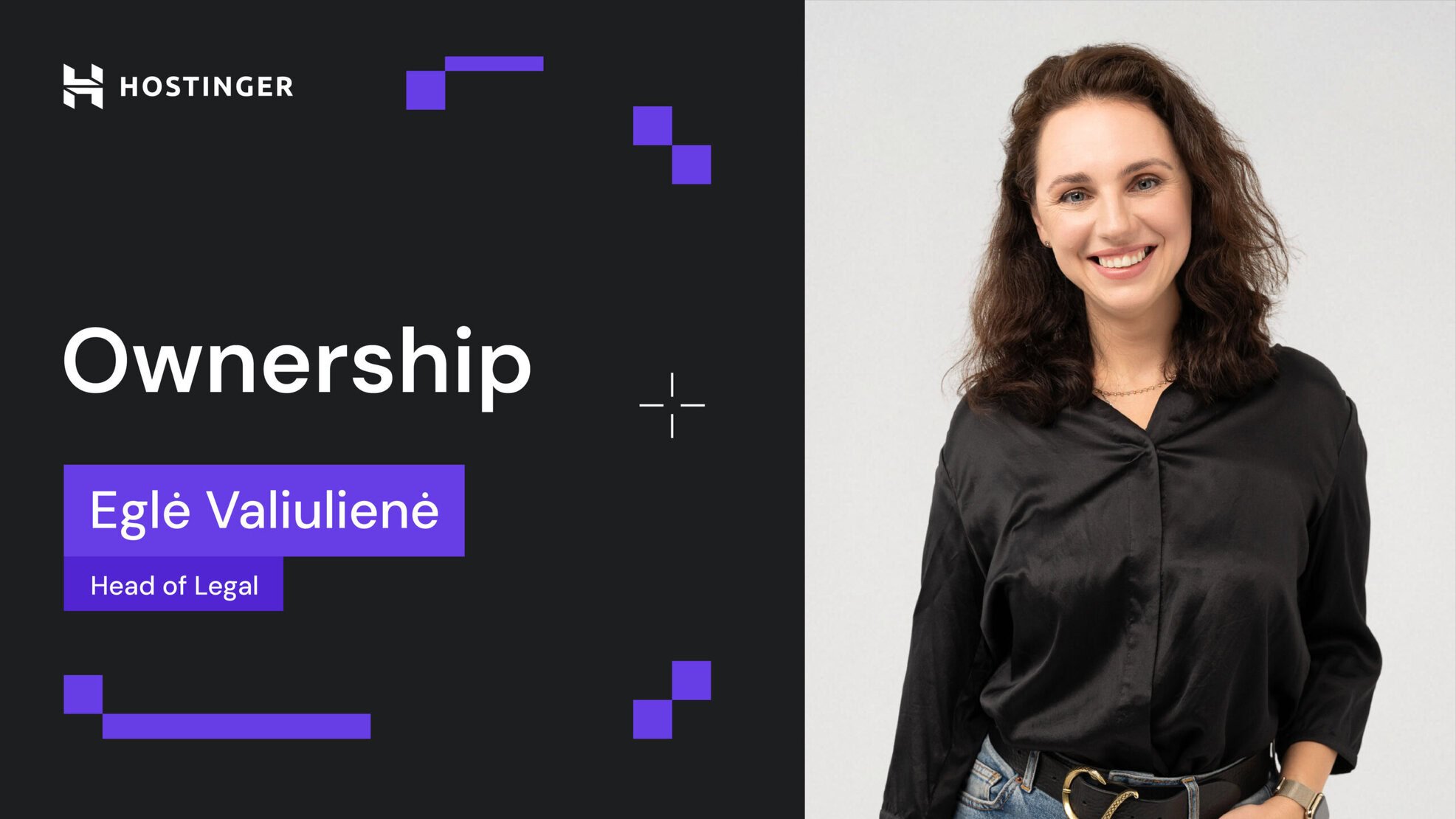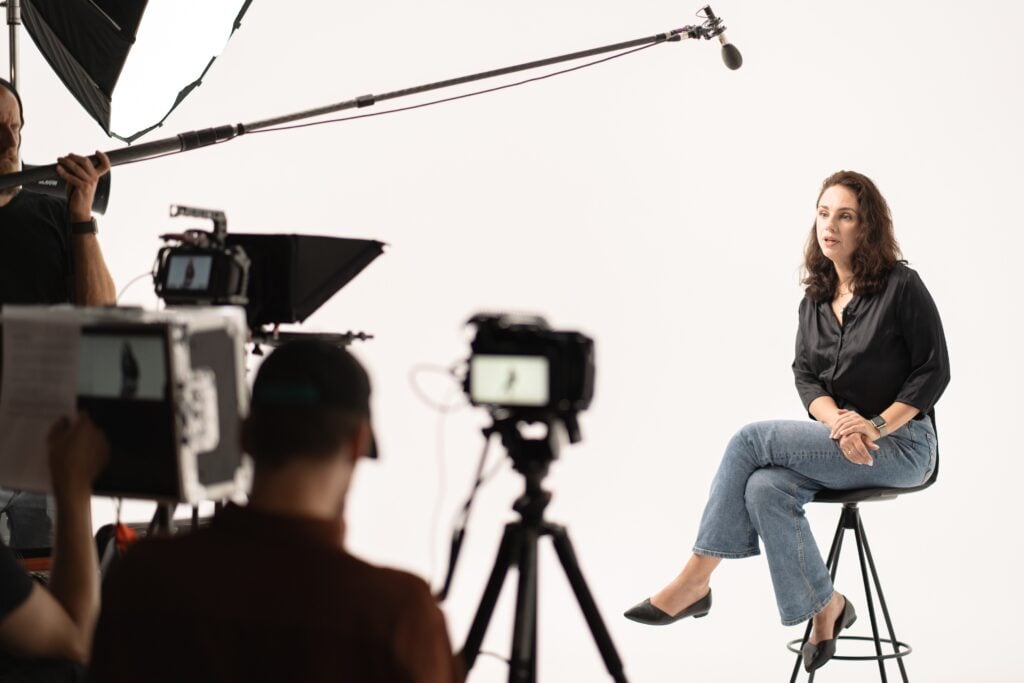Wednesday January 15, 2025


“Do it right or don’t bother doing it at all,” – that’s the advice I took from my father.
It has helped me in both my personal life and my career as Head of Legal at Hostinger. These simple words perfectly convey the essence of ownership – a principle that plays a big part in our culture. Continue reading to find out how ownership looks at Hostinger and what we gain from it.
Achieving the best result
Ownership is an essential principle not only at work but also in my daily life. I believe that adhering to it is a sign of maturity and responsibility. That’s why I teach my daughters to have a sense of ownership as well.
But what exactly is ownership? For me, it’s about truly caring for what one does, trying to achieve the best result, and taking full responsibility without anyone standing behind your back and supervising you.
In every workplace, you could say, ‘It’s not my problem,’ ‘Someone else might deal with it,’ or ‘That’s not my job’ in a lot of situations. Ownership is the opposite of that. You take into account not only your own but also the whole company’s perspective. You want to contribute to the company’s success. So, even when you’re delegating the task to others, you still feel responsible for the result.
Committed in heart and mind
I believe that half-hearted efforts fail and lead to stagnation. Therefore, only those who are truly committed and passionate about what they do can strive in an organizational culture such as Hostinger’s.
At work, this principle works in many ways. It’s how you approach your tasks – not only doing them mechanically but thinking of their purpose. It’s also how you question things and raise issues. You do so because you feel like you are part of your company and your team.
In short, you want to make an impact.
Clear responsibilities – better results
At Hostinger, we have clear processes for implementing ownership – every project and issue has a Directly Responsible Individual (DRI).
It brings much more clarity. We avoid misunderstandings when one colleague expects another colleague to do something, and that colleague believes that the third person should take responsibility. It also encourages stronger engagement because when you own it, you feel responsible for it, so you get a lot more invested in it.
In that way, DRIs strengthen our ownership culture and help employees perform better.
Taking action
However, having a DRI does not imply that one person is responsible for one specific project or cause. You can be responsible for multiple things. Furthermore, you can show initiative, like when I decided that the Vilnius office needed some liveliness.
First, I raised this question and took matters into my own hands. Now, the Vilnius office has a more vibrant space with art pieces from talented young artists in Lithuania and the Baltic region. This project allowed me to gain new experience in a field that was not directly related to my role as the company’s legal representative.
Colleagues were happy about the changes in our office, and I was able to improve our company in a different way than usual. This is one example of how personal initiative and not shying away from new projects and responsibilities bring benefits to all. That, I think, is an important aspect of ownership.
Balancing act
I admit that there are some challenges involved in wanting to make a broader impact – mainly the risk of overcommitting. Ownership doesn’t mean that you take on any and every project. Taking responsibility for the results means only committing to those projects for which you have the time and capacity to deliver results without compromising quality.
Ownership inevitably involves long-term thinking. You must carefully weigh how your side projects will affect your main tasks and aims. So, good planning habits, good decision-making, good foresight, and the ability to approach things realistically go alongside this principle.
Enabling ownership
I honestly believe that ownership can be contagious – when people see that their peers really care, put extra effort, and pride themselves on this principle; they are also more inclined to do so. That’s why it’s important to lead by example and personally contribute to the ownership culture.
If we want people to take individual responsibility for the results of their job, we must have the means to measure these results. That’s why we focus a lot on planning objectives and key results (OKR) at Hostinger. Together with DRIs, they are two main pillars that enable and support our ownership culture.
Driving force for growth
Ownership is a major driving force that moves the company forward in a focused and efficient manner. With the ownership mindset, each employee does what they need to do and is truly committed, so all their energy can be directed toward achieving ambitious goals.
It’s good for our customers too, because they receive not only the desired product but also much better quality support when they need it.
Employees with a sense of ownership will also establish a much stronger connection with customers, understand their problems better, and have greater motivation to solve them.

Bringing out the best in each
Finally, ownership benefits the employee as well. As it brings more clarity and allows us to achieve better results, we can grow professionally and personally faster. I think that people who internalize ownership tend to have better career opportunities.
Not only that – I have no doubts that it’s a win-win situation when ownership is firmly embedded in the company’s culture as one of its core principles.
That’s why I am happy to work in a company where everyone embraces this principle, is passionate and committed, truly cares about our customers, and isn’t afraid to take the initiative. At the end of the day, it enriches us and makes us better professionals and individuals.








